
Is living abroad after retirement genuinely happy?
In December 2011, during the pause on applications for Parent and Grandparent Program (PGP) immigration, the Super Visa for parents and grandparents of the Canadian citizens and permanent residents was introduced by Citizenship and Immigration Canada(CIC), with the purpose of supporting family reunification. The Super Visa could be valid for up to 10 years and has significantly facilitated the process for Canadians to invite their parents/grandparents to live in Canada. This time, CRAS (Canada) zooms in on Canadian Chinese and their parents/grandparents who have settled down in Canada: What do their lives look like on a daily basis? Have they enjoyed their stay since the first arrival here? In order to further interpret the topic of “living abroad”, which has been one of the focus points in Chinese community, CRAS (Canada) surveyed these senior visitors/immigrants and the results may surprise you.
According to the latest report from CRAS on Chinese Elderly Immigrants in Canada, nearly three fourth (74%) of participants have enjoyed their time spent in Canada. The majority (91%) of immigrant elders rated their lives in Canada today as meeting or going beyond expectations, and only 11% of participants considered living in Canada to be fall short of expectations.
Life Satisfaction (in Canada) in comparison to own expectations

Exceeded Expectations: 38.3% Matched Expectations: 53.1% Less Than Expected: 10.6%
I enjoy living in Canada

Strongly Agree: 10.6%, Agree: 63.8% Neutral: 21.3%, Disagree: 4.3%
Why would senior immigrants find their stay in Canada enjoyable?
The key attributes make living in Canada appealing to senior immigrants in Chinese community are: the people-oriented society, the caring culture towards underprivileged groups, the further potential in future economic development, the fascinating natural environment and etc.
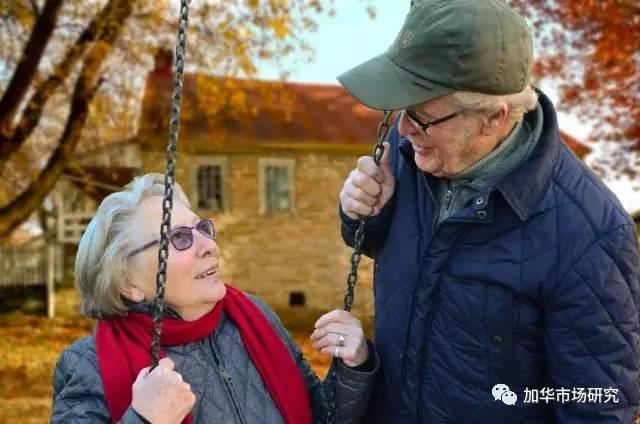
“Recently I have read an article regarding a clothing shoplifter who was caught by police – knowing the financial difficulties that this person was suffering altered the mind of the policemen. Eventually this shoplifter received the help and good wishes from police to encourage him get his family out of the difficult situation. I feel quite moved by this story, and this truly reflects the impression that Canadians strike me as considerate and caring people. This people-oriented culture has permeated society in many aspects – it is the charm of Canada that I appreciate the most.” – A Senior surveyee
Soaked in the caring culture, healthcare is also one of the channels that Canada impressed senior citizens.
“Lately I had a surgery in Toronto Western Hospital. Though I have had the same operation done in China, the experiences were dramatically different for me. Let alone the professionalism and medical skills – to some extent, some of the technical skills in China may even be further developed due to the extensive clinical experience – the respectful and warm attitudes that physicians and nurses treat patients in Canada are precious. For instance, last time when a patient on a gurney had to be waiting in the hallway for about 10 minutes, nurses particularly offered a floor screen for protecting his privacy. The respect and care that this country has towards patients, the elderly, the disabled and others from disadvantaged speak for the core values of Canada. It is one of the reasons why I enjoy my time spent in Canada.” – A Senior surveyee
What are regrets or concerns living in Canada?
At the same time, senior immigrants listed a few concerns or examples when they had a hard time adapting themselves to local lifestyle, such as the lack of fun social life, GMO foods, low working efficiency, long and suffering wintertime and etc.

“It was hard in the beginning - unlike the social life back in China that I could be around with plenty of old friends to enjoy the life, exercising together and visiting relatives. However, it seems that I have been gradually used to the life here.”
“ GMO food is a serious concern here. It is something that worries us indeed. The sign for GMO is not as clear as it is supposed to be, plus non-English speakers like us can hardly understand the GMO sign as well.”
“ Working efficiency here is incredibly low. The road nearby has been under construction for a whole summer and is still unfinished. This cannot take more than two days in China. The power was out last winter, and it took a week for some regions to get back in life with electricity. How inconvenient! It is hard to imagine and accept these as a newcomer.”
“ Most of us dislike the winter here. What a long winter – it would be better to live in a condo as having a walk is still possible. You rarely go out at your spare time in winter if you live in a house.”
– Senior surveyees
Source of income
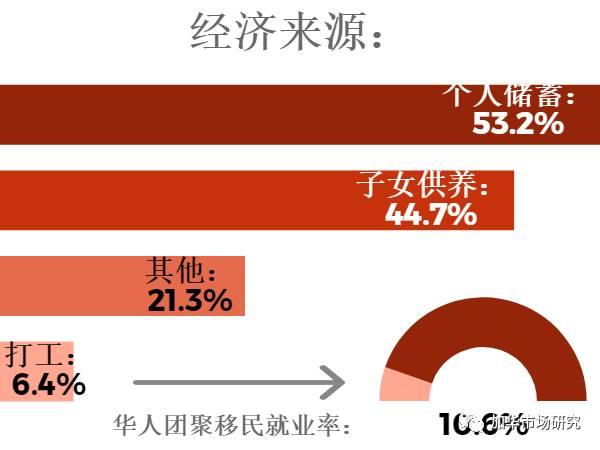
Over half of the elderly immigrants (53%) indicated in the survey that they would rarely go out or participate in activities other than family gathering. The main reasons probably lie in the language barrier and difficulties when going out alone:
Whether or not you would participate in social gatherings or community activities
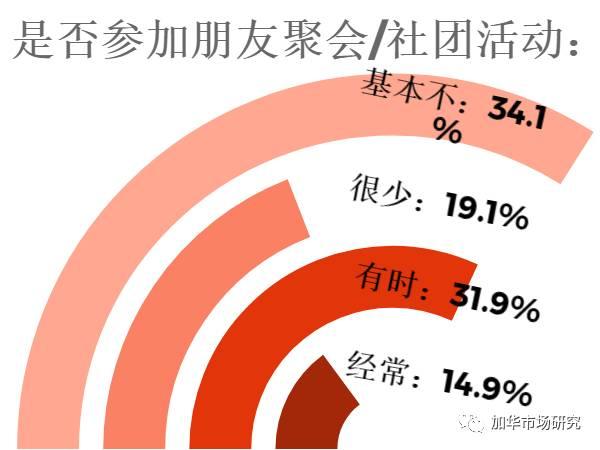
In this research, it is discovered that over half of the elderly immigrants (55%) do not know English at all, and over one third of the elderly immigrants (36%) know some English which is yet enough for basic communication.
The majority of the elderly immigrants (92%) do not own a valid driver’s license, and thus they are not able to drive but commute only via public transit or with their family who can drive in Canada. Unlike China, Canada has a vast territory with a sparse population and underdeveloped public transit system, which would post certain level of barrier to the elderly immigrants.
English proficiency & The possession of driver’s license
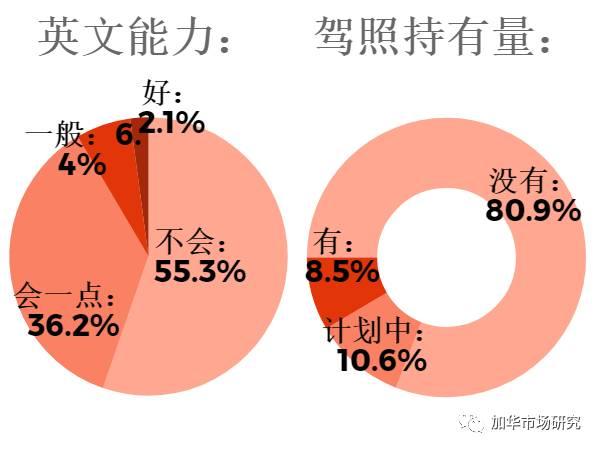
Being filial is an eternal subject among Chinese community, it is every son’s and daughter’s responsibility and duty to make elderly parents to adjust to the new environment as quickly as possible and live a happy life. CRASC suggests to families who have elderly immigrants the followings:
-
Encourage elderly parents to learn English and Canadian culture. The Canadian government and some communities offer a vast amount of free English learning courses specifically to the elderly immigrants, it is recommended to select one suited course for the elderly immigrants.
-
Encourage the elderly parents to go out and participate in all kinds of community activities independently, and provide necessary help and support.
-
If the physical condition of the elderly parents permits, it is suggested to let elderly parents visit China on a regular basis. In this research about two thirds (64%) of the elderly immigrants express that the most ideal situation is being able to commute between China and Canada.
If free to choose, you would
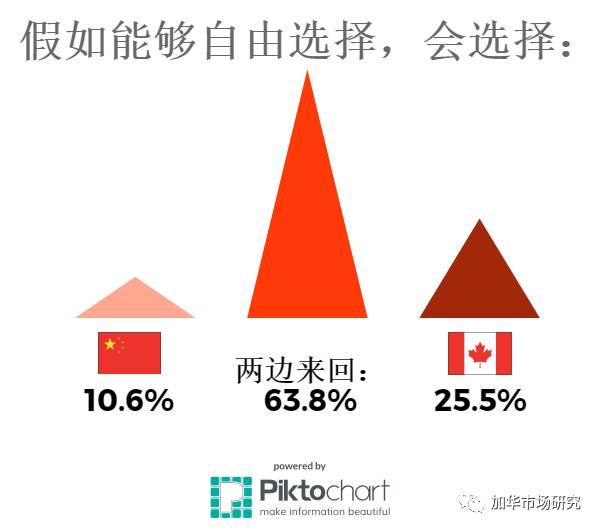
Methodology
This survey was sponsored by Chinese Research and Analytics Society (Canada) (CRASC). Data was collected from July 20 to August 10, 2017 via the online survey platform of lediaocha.com. Survey links were distributed among Chinese immigrants in Canada though WeChat Moment and WeChat groups by CRASC members. In total, 47 valid samples were received. Data processing and analysis were conducted by CRASC members. Thanks for the contribution made by CRASC members Dylan Gao, Kathy Cheng, Yelu Li, Evelyne Han, Sophie Cao and Stacey Zhao.
About Chinese Research & Analytics Society (Canada)
Chinese Research & Analytics Society (Canada) (CRASC) is a not-for-profit professional organization founded by a number of research and analytics professionals of Chinese origin who currently work in the Greater Toronto area. The organization serves as a community for research and analytics professionals originally from China to network, share, learn from one another and develop their career in Canada. CRASC is also committed to bridge the information and insights gap about Canadian Chinese as one of the largest ethnic groups in Canada. We believe that our organization is best positioned to provide the public, government organizations, media, and businesses in Canada and China with an unbiased view of Canadian Chinese, their lifestyle, values, opinions and their needs.